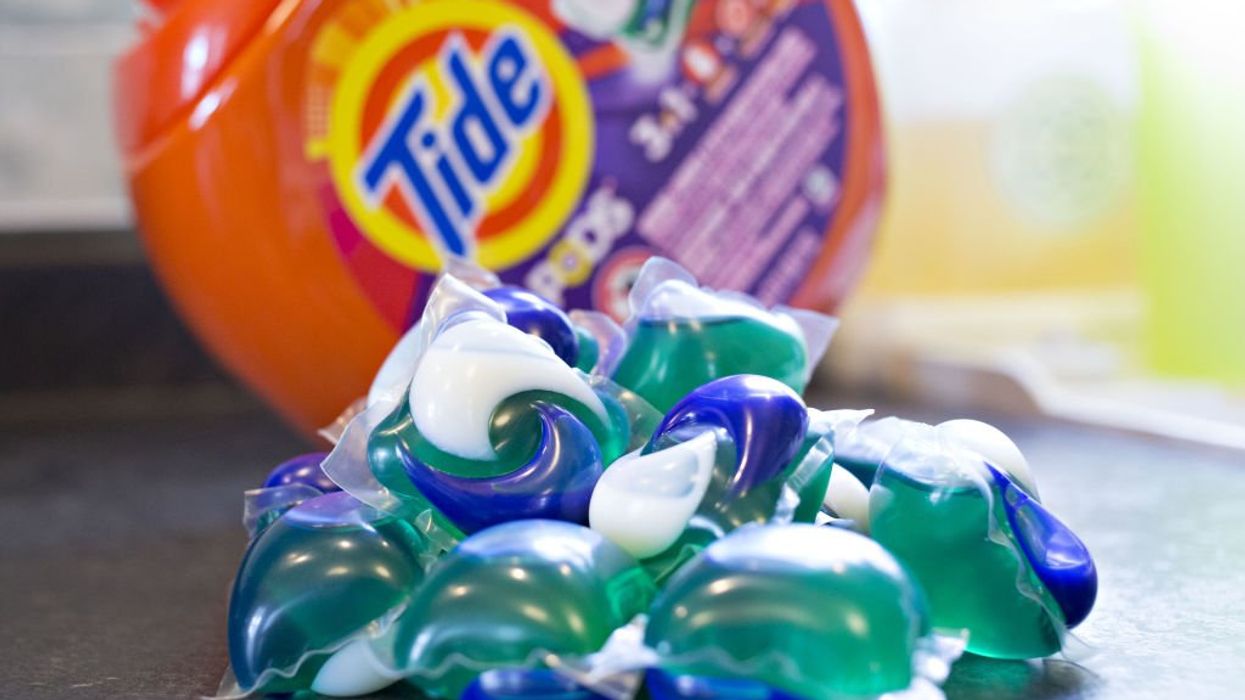
Daniel Acker/Bloomberg via Getty Images

Democratic New York City lawmakers are weighing banning detergent pods to reduce the microplastics entering the city's waterways, the New York Post reported Monday.
Last week, City Councilman James Gennaro (D) introduced new legislation, the "Pods are Plastic Bill," which would ban "the sale of laundry and dishwasher pods and sheets using polyvinyl alcohol." If passed, the measure would take effect in 2026.
Polyvinyl alcohol, also known as PVA, is a synthetic resin that is water-soluble and biodegradable, according to Science Direct. PVA is used as a film to create detergent pods that dissolve during the wash cycle.
Blueland, a company making "eco-friendly" cleaning products, claims that the plastic polymer used to create the detergent pods and laundry sheets "does dissolve," but "it doesn't always biodegrade," based on a study published in the International Journal of Environmental Research and Public Health. The company argues, according to the study's findings, that while PVAs can be biodegradable, they require "extremely specific" conditioners. Otherwise, the synthetic plastic polymer dissolves into microplastics.
"In order for PVA to fully biodegrade it requires the presence of very specific microorganisms and enzymes to aid in the degradation process. In addition to these microorganisms, it also requires a specific amount of time in the wastewater water treatment facility," the company stated.
Blueland is backing Gennaro's proposed legislation. The company's co-founder, Sarah Paiji Yoo, told Fast Company, "Companies should not be allowed to put microplastics into products that are designed to go down our drains into our water."
Yoo noted that most consumers do not realize that dissolvable laundry pods are made from plastic.
"It did bother us that this whole industry was built on consumers not realizing that this material was plastic," Yoo told the news outlet.
If passed, the bill would impose a $400 fine for selling the pods and $800 for a second violation, and fines max out at $1,200 for additional violations. The legislation would also "require education and outreach to retail and wholesale businesses on compliance with the requirements of this law."
Gennaro told the Post that PVAs "are the most concerning of emerging contaminants."
"It's important for people to know I'm being very cautious and we're taking a science-based approach.," Gennaro continued. "But I think the science is ultimately going to bear out this is something council should act upon."
"I need a little more [information], but I put the bill out to get everyone's attention," he noted.
According to a recent study conducted by New York University researchers, "forever chemicals" found in microplastics are causing $250 billion per year in health care costs in the United States, Blaze News previously reported
The chemicals, also referred to as PFAS, or per- and polyfluoroalkyl substances, are found in many everyday products, including non-stick cookware, cleaning supplies, and cosmetics. PFAS have been linked to many health issues, including liver disease, kidney disease, cancer, and lower fertility.
The American Cleaning Institute, a trade association representing P&G, Clorox, Unilever, and Church & Dwight, called the proposed legislation "unnecessary" and noted it would limit the companies' ability to create "significant sustainable solutions that are delivering positive environmental impact and progress in cleaning sustainability."
The organization further accused Blueland of attempting to discredit the use of the polyvinyl alcohol "despite decades of proof on safe use."
"Once again we are seeing a disappointing and disingenuous misinformation campaign launched against polyvinyl alcohol use in products like laundry packets and automatic dishwasher tabs," the ACI stated. "And as in the past, the campaigners – led by Blueland – are relying on shoddy science and intentional distortions about this."
The ACI called the water-soluble pods "a sustainability success story."
Like Blaze News? Bypass the censors, sign up for our newsletters, and get stories like this direct to your inbox. Sign up here!